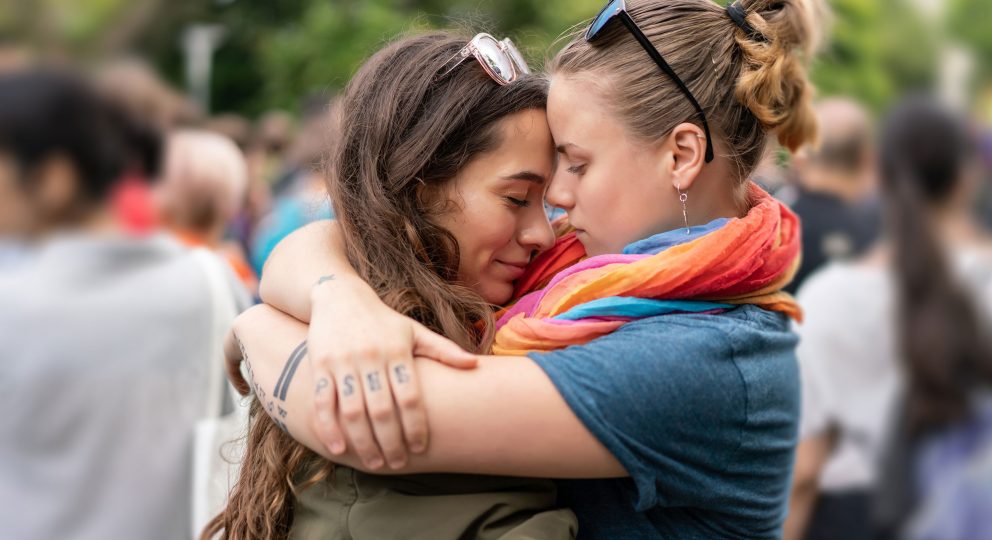Today, in the aftermath of Pride – in the wake of parades and marches strutting their colorful stuff through the streets of Seattle, Portland, Cleveland, New York, and Chicago – we’d like to turn our attention to same-sex relationships.
Dr. John Gottman and Dr. Julie Schwartz Gottman have observed the strength and resilience of same-sex couples, even in the midst of the cultural and social stresses to which they are uniquely vulnerable. Together, the Gottmans have made a commitment to assuring that lesbian and gay couples have as much access as straight couples to resources for strengthening and supporting their relationships.
Using state-of-the-art methods to study 21 gay and 21 lesbian couples, Drs. John Gottman and Robert Levenson (UC Berkeley) were able to learn what makes same-sex relationships succeed or fail in The 12 Year Study.
One key finding: Overall, relationship satisfaction and quality are about the same across couple types (straight, gay, and lesbian) that Dr. Gottman has studied. This result supports prior research by Lawrence Kurdek and Pepper Schwartz, who found that gay and lesbian relationships are comparable to straight relationships in many ways.
According to Dr. Gottman, “Gay and lesbian couples, like straight couples, deal with every-day ups-and-downs of close relationships. We know that these ups-and-downs may occur in a social context of isolation from family, workplace prejudice, and other social barriers that are unique to gay and lesbian couples.” However, his research uncovered differences suggesting that workshops tailored to gay and lesbian couples can have a strong impact on relationships.
How well do you know your partner?
In conducting interviews, coding facial expressions, and collecting other measures, the researchers found the following.
Same-sex couples are more upbeat in the face of conflict. Compared to straight couples, gay and lesbian couples use more affection and humor when they bring up a disagreement, and partners often give it a more positive reception. Gay and lesbian couples are also more likely to remain positive after a disagreement. “When it comes to emotions, we think these couples may operate with very different principles than straight couples. Straight couples may have a lot to learn from gay and lesbian relationships,” suggests Dr. Gottman.
Same-sex couples also use fewer controlling, hostile emotional tactics. Drs. Gottman and Levenson also discovered that gay and lesbian partners display less belligerence, domineering, and fear in conflict than straight couples do. “The difference on these ‘control’ related emotions suggests that fairness and power-sharing between the partners is more important and more common in gay and lesbian relationships than in straight ones.”
In a fight, gay and lesbian couples take it less personally. In straight couples, it is easier to hurt a partner with a negative comment than it is to make one’s partner feel good with a positive comment. This appears to be reversed in gay and lesbian couples. Same sex partners’ positive comments have more impact on feeling good, while their negative comments are less likely to produce hurt feelings. “This trend suggests that gay and lesbian partners have a tendency to accept some degree of negativity without taking it personally,” Dr. Gottman observes.
Unhappy gay and lesbian couples tend to show low levels of “physiological arousal.” This is just the reverse for straight couples. For them, physiological arousal signifies ongoing aggravation. The ongoing aroused state – including elevated heart rate, sweaty palms, and jitteriness – means partners have trouble calming down in the face of conflict. A lower level of arousal allows same sex partners to soothe one another.
In conflict, lesbians show more anger, humor, excitement, and interest than conflicting gay men. This suggests that lesbians are more emotionally expressive – positively and negatively – than gay men. This may be the result of being socialized in a culture where expressiveness is more acceptable for women than for men.
Gay men need to be especially careful to avoid negativity in conflict. When it comes to repair, gay couples differ from straight and lesbian couples. If the initiator of conflict in a gay relationship becomes too negative, his partner is not able to repair as effectively as lesbian or straight partners. “This suggests that gay men may need extra help to offset the impact of negative emotions that inevitably come along when couples fight,” explains Gottman.
And what about sex?
In their famous 1970s study, Masters and Johnson found that the gay and lesbian couples have sex very differently from the heterosexual couples or strangers. The committed gay and lesbian couples were the only people excited by their partner’s excitement, while the others were focused on getting to orgasm. Gay couples turned towards their partners’ bids for emotional connection during sex. They took their time, enjoying the ecstasy of lovemaking. Rather than being constrained by a single-minded focus on the end “goal,” they seemed to enjoy the stimulation and sensuality itself.
To learn more, clinicians and all others interested may find The 12 Year Study here.
Sign Up and Start Your Relationship Transformation
Subscribe to Gottman Love Notes and get the latest on relationships, therapy, and much more from the experts. Includes a free download and access to special pricing on Gottman products every month.






